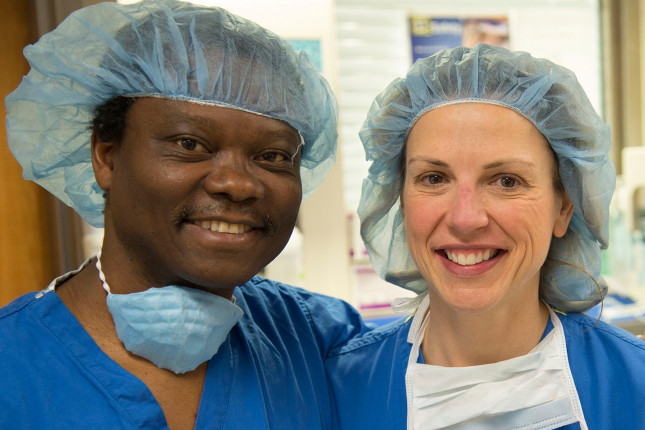
Washington University School of Medicine is committed to the recruitment, retention and professional development of a diverse faculty.
This commitment is reflected among the core goals of the Office of Faculty Promotions and Career Development, headed by Renee Shellhaas, MD, MS and the Office of Diversity, Equity and Inclusion, headed by Sherree Wilson, PhD. These include
- Striving for a consistent, supportive working environment, framed by appropriate guidance and mentorship, to sustain all faculty members in achieving their full professional potential.
- Enhancing communication between administration and faculty, including facilitation of understanding of institutional policies, procedures and roles and national issues of interest related to faculty professional development.
- Promoting a gender-neutral environment, which includes increased representation of women on the faculty, particularly at the most senior levels.
- Working toward a substantial increase in faculty diversity at all levels through increased recruitment, retention and advancement of underrepresented ethnic minorities.
In 2005 the School of Medicine launched a wide-reaching initiative to encourage departments to hire and retain faculty from diverse backgrounds. The effort goes hand in hand with a Barnes-Jewish Hospital strategy that aims to recruit more residents and fellows from underrepresented groups.
Stay in touch
Tell us more about yourselves by filling out the Directory Update form »
Faculty Diversity Scholars Program
The Faculty Diversity Scholars Program, created by the Faculty Diversity Committee and Larry J. Shapiro, MD, former dean of the School of Medicine, includes an incentive plan for departments to recruit faculty from minority groups.
“The growing cultural diversity of America is a phenomenon that will reshape the practice of medicine in the 21st century and beyond. We are responding to the changing demographics of this nation and the increasing health needs of our own community by improving our enrollment of students and the recruitment of faculty from underrepresented groups,” Shapiro said. Since its inception seventeen scholars have been recruited.
Minority faculty at Washington University have embraced this sense of ”family” and collective mentoring, reflected in informal socials and networking events at the home of Will Ross, MD, MPH, associate dean for diversity.
A faculty directory is maintained to facilitate contacts and networking among faculty and medical trainees. Faculty members are encouraged to update their contact information.
Learn more about the Faculty Diversity Scholars Program »
Programs to Increase Diversity in Individuals Engaged in Health-Related Research (PRIDE) July 11-27, 2022
Washington University School of Medicine offers an all expense paid summer institute program to increase diversity in the field of Cardiovascular Disease Comorbidities, Genetics and Epidemiology (CVD-CGE). The program is open to junior faculty and researchers (mentees) in the biomedical and behavioral sciences from underrepresented backgrounds and/or with disabilities. Space is limited for the 2022 mentored summer training programs so apply early!
Who: Eligible applicants are junior-level faculty or scientists with a background that is underrepresented in the biomedical or health sciences, and are United States Citizens or Permanent Residents. Research interests should be compatible with those of the National Heart, Lung, and Blood Institute (NHLBI) in the prevention and treatment of heart, lung, blood, and sleep (HLBS) disorders.
What: This all-expense paid program incorporates effective mentored training opportunities to enhance research skills and to promote the scientific and career development of trainees with a research interest in cardiovascular disease comorbidities, genetics and epidemiology.
Trainees will learn effective strategies for preparing, submitting and obtaining external grant funding for research, including extensive tips on best practices.
The program includes:
- A year-long mentored research experience that includes two consecutive 2-week summer sessions and multiple mentor-mentee meetings throughout, beginning July 11, 2022
- Opportunity to apply for Small Research Project (SRP) grants with funding. Applications due 1 month after Summer 1 with project to be completed within 9-12 months of award.
- Group brainstorming sessions with mentors and mentees to review and refine ideas for SRPs and external grant applications
- Mid-year meeting for all participants with their mentors
- Annual meeting with all 9 PRIDE programs and NHLBI (April 2023)
- Opportunity to develop a network of collaborators and resources to conduct research at the interface of genetics, epidemiology, and cardiovascular disease and risk factors
- The core objective is to prepare mentees to pursue independent research in one of the NHLBI mission areas of heart, lung, blood, and sleep disorders through submission of research grants within 2 years of the second summer training session.
Learn more about the PRIDE Program »